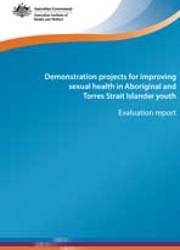Summary
- The Office for Aboriginal and Torres Strait Islander Health (OATSIH) funded six demonstration projects aimed at improving the sexual health of Aboriginal and Torres Strait Islander young people over 3 years (2008-2011).
- The aims of the projects were to:
- increase the number of Aboriginal and Torres Strait Islander young people accessing services for the testing and treatment of sexually transmissible infections (STIs) and blood borne viruses (BBVs)
- reduce the level of risk behaviours
- contribute to the development of best practice approaches.
- The Australian Institute of Health and Welfare (AIHW), Kirby Institute and the six organisations developed a range of indicators to monitor and evaluate the demonstration projects. The AIHW collected six-monthly data on these indicators, and conducted site visits to evaluate the success of these projects.
- Due to limitations with data availability and quality, and the relatively short timeframe of the evaluation, it was not always possible to assess the effectiveness of projects in achieving program objectives and expected outcomes.
- The range of qualitative information collected for the evaluation, however, enabled the key features of the more successful projects to be identified. A 'successful' project in this context was one that successfully engaged with the community and young people, and as a result the project was accepted by these groups.
- The evaluation identified the following as key features of a successful sexual health program:
- appropriate consultation with a broad range of stakeholders, including community Elders, young people and health professionals
- engagement and developing partnerships with the community, organisations and services
- culturally appropriate project design and implementation
- project design, delivery and implementation that was flexible and adaptable
- staff who were respected by the community, accessible to young people, engaged well with young people, and were the same gender as the target group.
- Recruitment and retention of staff was a significant challenge faced by many of the projects. Greater training and support need to be provided for the Aboriginal and Torres Strait Islander sexual health workforce to increase the available pool of people with the
required skills.



